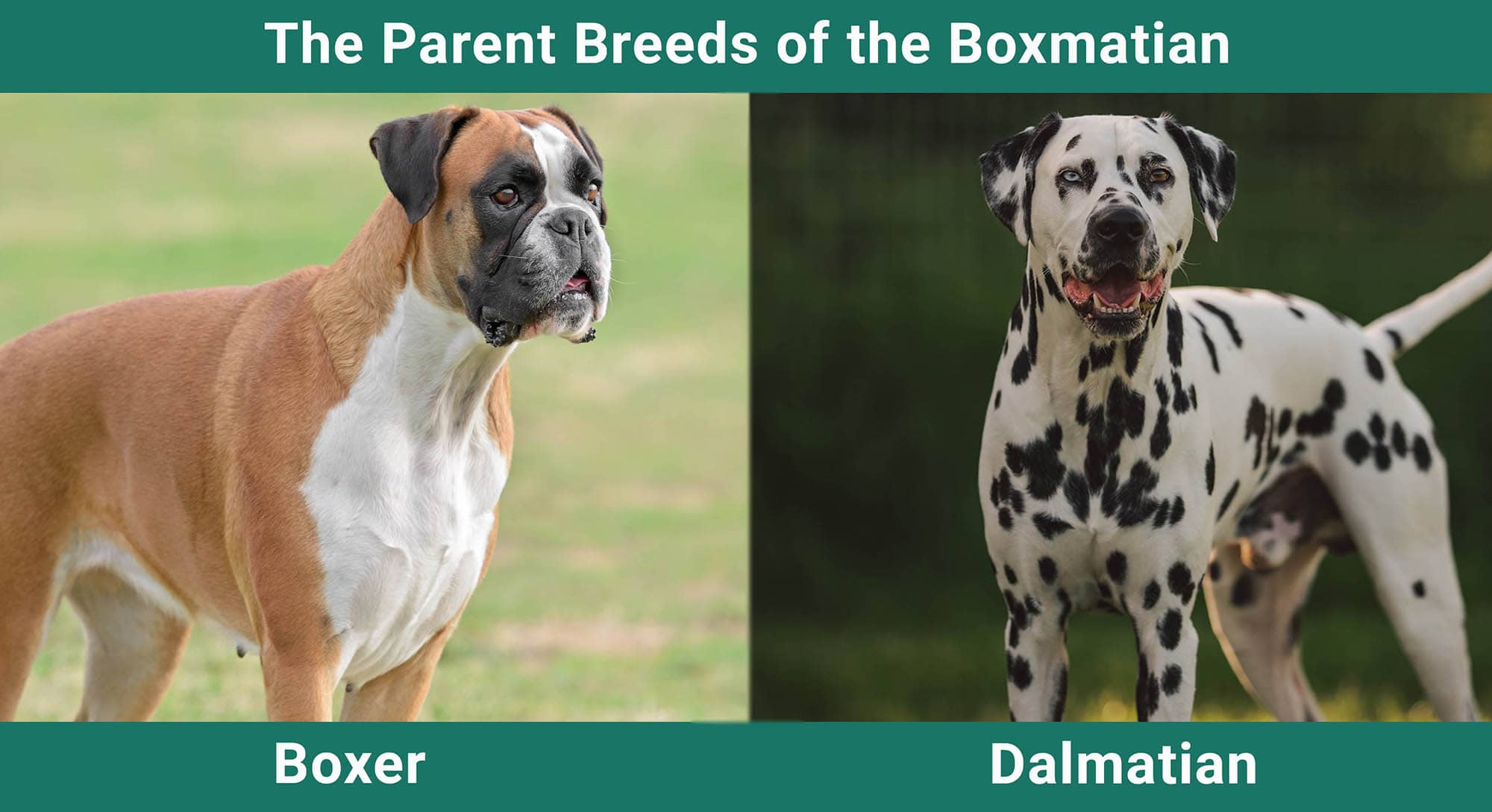Click Below to Skip Ahead
Two of the most recognizable canines combine to make a distinct crossbreed offering their best qualities. We’re talking about the Boxmatian, a delightful hybrid blending the Boxer’s powerful stature and the Dalmatian’s dignified manner. The Boxmatian receives an elegant form, high intelligence, charming goofiness, and boundless loyalty to their family from both parents.
Is this delightful mix the best pet for your household and family routine? We’ll give you the details as we explore the Boxmatian’s care and temperament.
Breed Overview
Height:
19–25 inches
Weight:
45–80 pounds
Lifespan:
10–13 years
Colors:
Black, white, liver
Suitable for:
Active families or individuals, adults wanting a good watchdog
Temperament:
Loyal, loving, intelligent, playful, silly, energetic
The Boxmatian is a well-built and hardworking mixed breed. Boxers and Dalmatians have backgrounds as guardians, but pet owners prize these graceful dogs for their affectionate natures and incredible potential.
The Dalmatian, an ancient breed with lineages dating to before 2,000 B.C., has a well-known reputation as a firefighter companion. But the trainable, athletic dog has been versatile enough to take on numerous roles throughout history. It was a capable retriever, guard, ratter, and even circus performer. With their smooth, strong gait and affinity for horses, the Dalmatian became the definitive carriage dog in the 1800s before expanding their use as a fire wagon leader.
As a member of the working group, the Boxer is the other half contributing to the Boxmatian’s appearance and personality. Descended from the Bullenbeiser, an extinct Mastiff breed, they boast a hunting heritage. During the 1900s, Boxers transitioned to more low-key jobs. Today, these energetic and intelligent dogs are highly desirable in many roles as pets, police dogs, and service animals.
Boxmatian Characteristics
Boxmatian Breed Puppies
Young Boxer Dalmatians are full of energy and excitement. Whether that’s positive or negative primarily depends on you. Puppies need training and socialization as early and frequently as possible to stave off aggressive, destructive, or otherwise dangerous behavior.
You likely won’t find a reputable Boxmatian breeder, as they’re not a common pairing in designer dogs. Being skeptical of anyone selling the cross is the safest move, and many backyard breeders care less about developing healthy dogs than making a quick buck. If you’re looking for responsible adoption, check your local shelter first. Many list their available dogs online for convenient searching.
Since Dalmatians and Boxers aren’t the most common dogs to find in a shelter, there’s a low likelihood that you would find a mix nearby. You may have to look to online communities for help. Services like PetFinder, ASPCA, and Adopt a Pet may give you the best opportunity to pinpoint a Boxer Dalmatian dog. But know that even then, it’s a slim chance you’ll find that exact mix.

Temperament & Intelligence of the Boxer Dalmatian
Boxers and Dalmatians are well-known as goofy and active dogs, traits you can expect in the average Boxmatian. With proper training from a confident owner, they are incredibly loving, loyal, and playful pets.
The Boxer and Dalmatian are intelligent dogs, landing in Coren’s top 100 at #90 and #62, respectively. They are alert and receptive, with both breeds boasting an eagerness to please and an affinity for their owners that motivates them in training sessions.
As a negative, their intelligence can make them stubborn and testy at often inopportune times. It can also lead them to boredom easily, which Boxmatians may channel into undesirable destructive behavior. In many ways, they demand a challenge and need a firm yet positive presence to guide them and plenty of activities to engage their minds and bodies. Toys and games are essential to keep them stimulated when they’re alone, while space to run will help them burn energy and stay docile.
Are These Dogs Good for Families? 👪
Boxers and Dalmatians make excellent family dogs but require similar considerations, making a Boxmatian’s inclusion in the family dynamic somewhat predictable. They are affectionate with children, and the little ones will surely appreciate the dog’s goofiness more than anyone.
Dogs and children should always have supervision when together. With a Boxmatian, a close eye is even more crucial. An enthusiastic dog of this size can be a hazard while playing with small children. On their part, children can become overly rough, causing these sensitive pups discomfort without realizing it, which could escalate into the dog showing signs of fear and aggression.
Does the Boxmatian Get Along With Other Pets? 🐶 😽
Boxmatians do well in the family circle, but socialization with other pets should be a top priority from a young age. Early pairings with other pets in the home will create a stronger, more comfortable bond for years.
Dalmatians tend to get along well with cats and dogs with proper introductions. Boxers can be more selective about other dogs and may become aggressive. Still, the same rules for introducing pets apply. With early socialization and a chance to grow with the other pet, Boxers work wonderfully with other animals, especially cats. Your Boxmatian will need supervised interactions with other animals in the home. But when they accept them as part of the family, they’ll offer your pets all the affection, loyalty, and playfulness they show to the rest of the household.
Though they’re rarely aggressive towards their owners, Boxers are more so toward other dogs than most breeds. But both of the Boxmatian’s parent breeds bear a protective nature, making them wary of any unknown person or pet. Since they’re territorial and a bit dominant, they perceive threats easily, requiring strict control while on the leash around other animals.
Things to Know When Owning a Boxmatian
Mixing the Boxer and the slightly smaller Dalmatian means you could be subject to some unique and potentially demanding health considerations. Here’s a look at what you can expect when owning a Boxer Dalmatian mix.
Food & Diet Requirements 🦴
Boxmatians need a high-quality diet that’s rich in proteins, healthy fats, and fiber. Weighing anywhere from 45 to 80 pounds, they may require 2–4 cups of food daily, split into two feedings. Given their energy levels and growth needs, you’ll have to adjust the feeding schedule and diet according to their life stage.
Dalmatians and Boxers are susceptible to dilated cardiomyopathy (DCM), a degenerative heart condition. With a potential link to increased risk of DCM in dogs, grain-free diets may not be an ideal option for your Boxmatian. Discuss ingredients like these, alongside serving size and frequency, with your vet to establish the best routine for your pup.
Exercise 🐕
Boxmatians are energetic and athletic dogs. They require at least an hour of daily activity and space to run around. A large, fenced-in backyard is perfect for them to release their energy. While not the most adaptable dog, they can live in apartments if you give them a decent amount of daily running. Avid hikers and joggers often align well with the breed’s preference for outdoor activity.
Training 🎾
Boxmatians may not be the best dog for first-time owners for several reasons, including their mischievous and attention-seeking behaviors. Obedience training is critical to establish boundaries, keeping them from becoming destructive or defiant. They are also sensitive dogs, so a firm hand must accompany positive reinforcement and reward-based training.
Crate training will be critical in developing good potty skills and getting your Boxmatian used to time alone. With their desire to be with their family, many have difficulty staying alone for more than a few hours. But when you provide the tools for success, they can acclimate to a changing routine. Give them adequate exercise, attention, and toys and games in the house to keep them occupied, relaxed, and easier to direct.
Grooming ✂️
Boxmatians are smooth, short-haired dogs, but that doesn’t mean they’re low-maintenance pets. While Boxers have relatively minimal grooming needs, your dog could be a heavy shedder if they inherit the Dalmatian’s coat. They don’t blow their coat like double-coated dogs, but brushing your dog daily may still be necessary to keep your house clean of hair.
The straight, short hair will thankfully decrease the chances of matting. As an active dog, a Boxmatian can get dirty quickly in the yard, so expect to bathe them regularly. Frequently trimming their nails and checking their eyes and ears are also critical. Mixing in some rough surfaces, like cool concrete, during the daily run can help keep their nails in check and reduce grooming.
Health and Conditions ❤️
Boxmatians are generally fit and healthy dogs less prone to the genetic diseases common to their parent breeds. Obesity and diabetes can afflict an overfed, under-exercised dog regardless of breed, and inadequate diets can cause numerous issues, including poor bone density, GI disorders, and failing dental health.
Frequent vet visits are a central aspect of responsibly raising a Boxmatian, no matter their ownership background or parentage. Given their active lifestyle, you and your dog could benefit greatly from pet insurance. With accident and illness coverage, you can immediately respond to any outdoor accident during playtime or adventuring with your dog without a looming financial burden.
- Hypothyroidism: A low-functioning thyroid gland leads to weight gain, lethargy, and various hair and skin problems.
- Allergies
- Gastric Dilatation and Volvulus (GDV): Also called bloat, this condition causes the dog to become gassy. In severe cases, the stomach can twist, closing off the entrance and exit points.
- Dilated Cardiomyopathy (DCM): A thinning and weakening of the heart muscles. The progressive disease can cause congestive heart failure.
Male vs Female
Generalizing distinctions between male and female Boxmatians isn’t easy. Outside of possible size differences, little differentiates the sexes in behavior or temperament. Some suggest females are more aloof, needier, and less playful than males, while boys can be more challenging to train. Training and environment will have more to do with their personality. With a present, devoted family willing to engage them, Boxmatians of either sex can thrive.
3 Little-Known Facts About The Boxmatian
1. Boxmatians Are Warm Weather Dogs
It may be obvious to some, but many fail to distinguish between cold-weather and warm-weather dogs. With both parents sporting short single coats, the Boxmatian decidedly falls in the latter camp. Though they can tolerate the cold when they’re engaging in vigorous activity, they may need extra layers for extended periods outside in chilly weather.
2. Boxmatians Excel in Many Sports
Trainable and powerful parent breeds make the Boxmatian well-adapted to several sports. Boxers have found success in rally, obedience, and agility, while the well-rounded Dalmatian excel in these sports alongside flyball, scent hurdling, dock diving, and tracking. Boxmatians can’t make it into the show ring, but there are many exciting ways to exercise, train, and bond with your dog.
3. Boxers Have a Brutal Past
Boxmatians inherit protective natures from both parents, explaining some of the wariness of other people and animals. In the Boxer’s case, their early history even predisposes them to violence. Like pit bulls, Boxers were the unfortunate focus of bull-baiting and dog-fighting circles in the 1800s. Though Boxers are generally reliable around other pets with training and socialization, it could be one reason they can be more temperamental with dogs, especially males.

Conclusion
Though hardly one of the most popular designer dog breeds, the Boxmatian has the perfect blend of qualities for a willing and capable owner. The active, exuberant, and often silly mixed breed brings excitement and joy to the home. Though they need attention and consistent guidance, they’re dependably loving companions for adults, children, and pets. When you give them the commitment they deserve, they’ll reward you handsomely with love and loyalty for many years.
See also:
- Doberman Dalmatian Mix: Pictures, Temperament & Traits
- Dalmatian Dachshund Mix: Care Guide, Pictures, Info & Traits
Featured Image Credit: (L) Anita Peeples, Unsplash | (R) Maria Ivanushkina, Shutterstock











